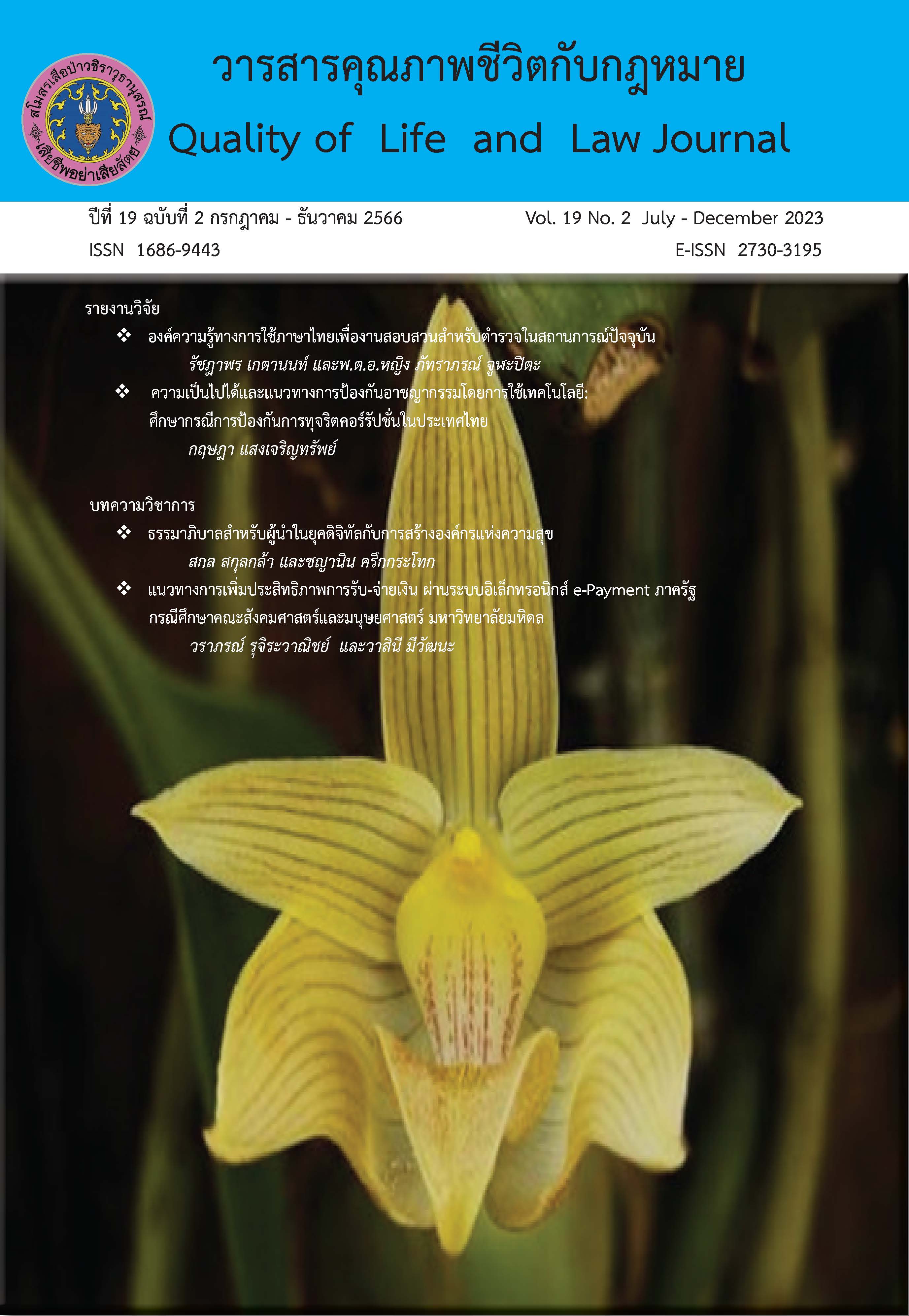Knowledge of Thai Language Usage for Police Investigations in Current Situations
Main Article Content
Abstract
This qualitative research aimed 1) to examine the current operational status and challenges associated with Thai language usage for investigative work conducted by inquiry officers, and 2) to study and gather relevant knowledge regarding Thai language usage for investigative work that aligned with the present circumstances. Employing a qualitative approach, data collection was facilitated through in-depth interviews and group discussions involving key informants closely affiliated with investigative work, as well as individuals knowledgeable in Thai language usage. Structured interviews and group conversation guidelines served as the research tools, while content analysis was employed for data analysis.
The research findings revealed the following insights: 1) The investigation into the current operational status and challenges of Thai language usage for investigative work revealed that inquiry officers had primary responsibilities, including report reception, witness interviews, and the execution of investigative procedures that required the use of Thai language for communication, listening, speaking, reading, and writing. However, challenges and obstacles were identified in the area of case report writing due to inadequate proficiency in Thai language usage. 2) Knowledge regarding Thai language usage for investigative work suitable for the present circumstances involved the skills of being an effective receiver and transmitter of information, which included the four communication skills of listening, reading, speaking, and writing. These skills were combined with knowledge of fundamental Thai language principles and four writing formats: narrative writing, summarization writing, abstract writing, and chronological event writing.
This research suggests were research should be conducted to find ways to increase the effectiveness of the use of Thai for current police investigations and the result of research should be used in teaching and learning the Thai language to promote the efficiency of using Thai language in investigative work for police cadets.
Article Details

This work is licensed under a Creative Commons Attribution-NonCommercial-NoDerivatives 4.0 International License.
- บทความหรือข้อคิดเห็นใดๆ ในวารสารคุณภาพชีวิตกับกฎหมายเป็
- กองบรรณาธิการไม่สงวนสิทธิ์
References
ชัชวาลย์ พิสุทธิวงส์. (2552). ปัจจัยที่มีความสัมพันธ์กับผลสัมฤทธิ์การฝึกหัดงานสอบสวนของนักเรียนนาย
ร้อยตำรวจ. [วิทยานิพนธ์ปริญญามหาบัณฑิต]. https://dric.nrct.go.th/index.php?/Search/SearchDetail/82540
ชนกพร อังศุวิริยะ. (2560). พัฒนาการเขียนภาษาไทย. สำนักพิมพ์จุฬาลงกรณ์มหาวิทยาลัย : กรุงเทพ.
ธีสุทธิ์ พันธ์ฤทธิ์. (2555). การสอบสวน. สำนักพิมพ์นิติธรรม : กรุงเทพ.
เนาวรัตน์ เจตดุ. (2555). การพัฒนาแบบฝึกทักษะการเขียนสรุปความ โดยใช้ข้อมูลท้องถิ่นไทยทรงดำ อำเภอ
เขาย้อย จังหวัดเพชรบุรี สำหรับนักเรียนชั้นมัธยมศึกษาปีที่ 2. [วิทยานิพนธ์ปริญญามหาบัณฑิต]. มหาวิทยาลัยศิลปากร. http://www.sure.su.ac.th/xmlui/bitstream/handle/ 123456789/7570/fulltext.pdf?sequence=2&isAllowed=y
บุญส่ง จันทรีศรี. (2557). การประเมินผลการฝึกหัดงานสอบสวนคดีอาญาของนักเรียนนายร้อยตำรวจ.
[วิทยานิพนธ์ปริญญามหาบัณฑิต]. https://dric.nrct.go.th/index.php?/Search/ SearchDetail/44381
บังอร สว่างวโรรส และเยาวภา พุกกะคุปต์. (2524). การวัดความสามารถในการเขียนภาษาอังกฤษเป็น
ภาษาต่างประเทศโดยใช้ข้อสอบแบบอัตนัยและปรนัย. วารสารภาษาปริทัศน์, (2)1, 49-60.
ภัทราภรณ์ จูฬะปิตะ. (2556). ความต้องการจำเป็นในการใช้ภาษาไทยเพื่องานสอบสวน. รายงานวิจัยฉบับ
สมบูรณ์. คณะสังคมศาสตร์ โรงเรียนนายร้อยตำรวจ.
มณีปิ่น พรหมสุทธิรักษ์. (2541). ภาษากับการสื่อสาร. คณะอักษรศาสตร์ มหาวิทยาลัยศิลปากร.
วิไล กิ่งคำ. (2552). การฟื้นฟูสมรรถภาพการใช้ภาษาไทย. ประชุมทางวิชาการของมหาวิทยาลัยเกษตรศาสตร์
ครั้งที่ 42: สาขาศึกษาศาสตร์ สาขาสังคมศาสตร์ สาขามนุษยศาสตร์ สาขาเศรษฐศาสตร์ สาขาบริหารธุรกิจ สาขาคหกรรมศาสตร์. กรุงเทพฯ, 436-446.
สุวัฒน์ วิวัฒนานนท์. (2552). การพัฒนาทักษะการอ่านคิดวิเคราะห์และเขียน. วารสารห้องสมุด T.L.A Bulletin, (53)2, 15-22.
Heaton, J.B. (1979). Writing English Language Tests: A Practical Guide for Teachers of English. 5th Edition, Longman. London.


